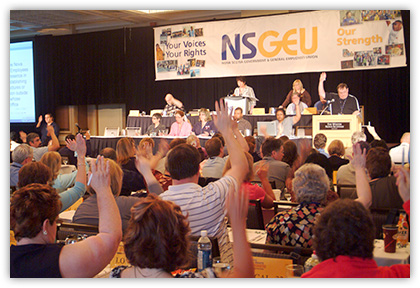Glossary
Glossary of Terms
A means to change, alter, improve, or correct the Constitution or By-Laws of NSGEU.
The Board is the governing body of the Union between conventions. It is made up of 36 members: 5 members of the Executive Committee; 8 regional councilors; and 23 Occupational Councilors. The Board of Directors has exclusive jurisdiction over the affairs of the Union between conventions.
Shows agreement by the committee with the resolution/constitutional amendment and gives a recommendation that the resolution/constitutional amendment should be adopted.
A Provincial Committee structured to review and give recommendations with respect to the future direction, goals and structure of the NSGEU and coordinate constitutional amendments on the Constitution and By-Laws.
Convention
Every three years, the NSGEU holds a Convention in which all Locals are entitled to send delegates. The Convention is the supreme governing body of the union. Convention sets the direction for the upcoming term. At Convention, the Executive Members of the Union are also elected.
Each Local elects delegates to Convention by formula within the NSGEU Constitution and By-Laws. The Local must first elect members who have attended 40% or more of their Local meetings in the previous year. If they cannot fill the Local’s delegate entitlement with members who meet that requirement, others may be elected as delegates.
Executive Committee of a Local
Made up of President, one or more Vice-presidents, Treasurer, Secretary (or Secretary-Treasurer), and Chief Steward. Elected by local members, responsible for coordinating all local activity.
Local means a group of members of the union comprised of one or more bargaining units in a geographical or work area.
A proposal or suggestion is formally made in a formal Union meeting.
A recommendation by the committee that the resolution/constitutional amendment should not be adopted.
The NSGEU consists of Occupational Councils which are built along sector lines. Occupational council reps are elected by each local with members in that sector. Council reps meet at least twice a year to discuss issues facing members within the sector. Each Occupational Council elects a member(s) to the NSGEU Board of Directors.
The NSGEU is divided into 8 regions. Each region is represented by a Regional Council whose members are elected by the locals within each region. Regional Councils meet between board meetings. Each region elects a member to the NSGEU Board of Directors.
A formal statement of opinion or determination adopted by a local or the NSGEU Board of Directors.
A Provincial Committee that receives all non-constitutional Resolutions for preparation and presentation at the Triennial Convention. The Committee makes recommendations of concurrence or non-concurrence for all Convention Resolutions.
The Executive Committee of the Union consists of the President, 1st, 2nd and 3rd Vice-presidents, and the Secretary-Treasurer. Just as the Convention is the supreme governing body of the union, and the Board of Directors is the decision making (governing) body between Conventions, the Executive Committee is charged with the responsibility of dealing with the affairs of the Union between the Board meetings.
